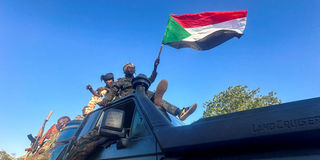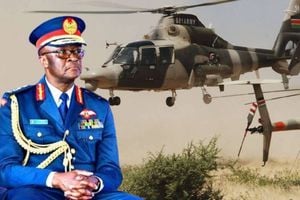Sudan war atrocities: Experts call for victim support

Sudan's army soldiers celebrate after entering Wad Madani, in Sudan, January 12, 2025.
What you need to know:
- Sudan is in a deadly war between the Rapid Support Forces and the Sudanese Armed Forces.
- Sudan was already in the eye of the ICC long before the current war began in April 2023.
Atrocities in Sudan’s current and past war will required the international community to support victims including in reparations for atrocities suffered.
Sudan is currently under a deadly war between the Rapid Support Forces (RSF) and the Sudanese Armed Forces, both of who are now accused of war crimes, crimes against humanity and genocide.
But experts gathering in Nairobi said the huge toll of current and past atrocities, including twenty years ago, means the international community must focus on mechanisms of accountability to dissuade the continual pattern of targeting civilians.
They spoke at a symposium organised by Wayamo Foundation titled Advancing Accountability for International crimes in Africa. The Foundation is a non-profit organisation that pursues rule of law and promotes justice for international and transnational crimes.
Mohamed Chande Othman, the chairperson of the UN Fact-Finding Mission on Sudan said the accountability mechanism must include a victim support and reparations entity to provide urgent support to the many victims of violations including of rape, gang-rape and other forms of sexual violence and grave violations against children.
He suggested that the accountability mechanism could be done through the expansion of the International Criminal Court (ICC) mandate or the set-up of a complementary judicial mechanism.
Sudan was already in the eye of the ICC long before the current war began in April 2023. Ousted leader Omar al-Bashir and various of his then senior government officials had been indicted from 2007 for war crimes and crimes against humanity.
But Bashir resisted the arrest and left power without facing the judges. The transitional government that took over from him in 2019 dilly-dallied on extraditing him to the ICC. It was toppled in a coup in October 2021 when RSF and SAF worked on the same side.
Othman, a former Chief Justice of Tanzania said his team had found evidence of sexual and gender-based violence (SGBV) such as rape, forced marriages and slavery particularly from Nyala, Al Fasher, Khartoum and Omdurman.
“While SGBV is ongoing and widespread in nature, it remains underreported primarily due to stigma and fear of retaliation. Of particular concern are those survivors who now or in future will have to return to their areas of origin where the violations and related crimes took place and perpetrators may still be present,” Mr Othman said at the symposium at the Aga Khan University Graduate School of Media and Communications in Nairobi.
The event on February 21 happened as the Rapid Support Forces met in Nairobi with allied political movements to sign what they called a ‘roadmap’ to a government of peace and unity.
Leaders of both RSF and SAF have been sanctioned by the US for the crimes in war.
Their charter was said to be backed by more than 10 groups although the group has not publicly explained the structure of their coalition arrangement.
Mr Othman pointed out that there are reasonable grounds to believe that war crimes (committed by both RSF and SAF) and crimes against humanity have been committed in the Sudan since mid-April 2023.
Mr Othman suggested an arms embargo, currently imposed on Darfur region, should be expanded across Sudan to protect civilians and raise the stake for accountability.
The UN Human Rights Council established the independent international fact-finding mission for the Sudan on October 11, 2023.
In September last year, its mandate was extended for another year.
Mr Mikel Delagrange a senior international legal advisor at Wayamo Foundation, pointed out that the most important thing in Sudan is to identify financiers or collaborators of the armed groups and target them with sanctions.
“As criminals continue to evolve their methods to evade accountability, we must adapt our practices to ensure that our actions lead to meaningful accountability and what we are doing adds value," he said.
Ms Tina Alai, Transitional Justice Advisor, UNHCR in South Sudan called for the creation of hybrid courts in Sudan as accountability measure.
She said the hybrid courts could be established in cases where the ICC may not be able to intervene immediately. Such courts have been successful in addressing atrocities as seen in Rwanda and Sierra Leone, she said.





